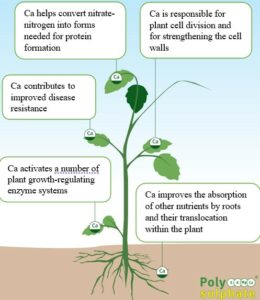Calcium: The Trucker of All Nutrients
First, we need to start in the soil. Calcium has many roles in the soil. Calcium aids in maintaining soil physical properties, and in reclaiming sodic soils. Calcium contributes to soil fertility by helping maintain a flocculated clay and therefore provides more aeration. Soil structure and water holding capacity are improved when soils are rich in calcium. Calcium also stimulates the growth of beneficial soil microorganisms, including nitrogen-fixing bacteria, and helps counteract toxins in the soil and in the plant. Soils deficient in calcium will result in an increase of weeds in the field such as dandelions. If minerals are balanced and there is an abundant amount of soluble calcium, then you will have a healthy crop.
Calcium is the trucker of all nutrients. This is because calcium improves the absorption of all nutrients and helps in their translocation within the plant. Calcium is vital for cell division and healthy cell walls, for root growth and hair formation, for enzyme activation, and protein production. When calcium is deficient, new tissues such as root tips, young leaves, and shoot tips often exhibit distorted growth from improper cell wall formation. Another problem that arises when calcium is deficient in the plant is a decrease in the resistance to insect pests. Legumes are high consumers of calcium. To obtain high-quality forage that promotes animal health and productivity, higher amounts of calcium are essential.
Now that we have high-quality forage filled with calcium, we can feed it to the cow. Calcium plays a vital role in the health of animals. In cattle and horses, its major functions include helping regulate muscle movement and acting as a chief component of bones and teeth. Calcium is vital for skeleton tissue and smooth muscle and nerve function including gastrointestinal motility and skeletal muscle strength. A shortage of calcium in the cow’s body can be apparent in multiple symptoms, including tremors, cows found in a ‘sitting’ stance and; eventually collapse, or even death. A common condition resulting from cattle deficient in calcium is hypocalcemia, or milk fever. Bottom line: the cow needs adequate amounts of calcium for colostrum and milk synthesis. Then the calcium is passed to humans as we drink their milk. There are many positive attributes for soil, plants, and animals when it comes to calcium.
Product of the Week: Bio-Cal
Bio-Cal is an exclusive, proprietary blend of multiple calcium sources ranging from soluble to time-released. As a liming material, it contains 32 percent calcium and provides highly soluble calcium that is both readily available to plants upon application and throughout the growing season. Applying calcium to soil can help mobilize nutrients and improve plant availability. Bio-Cal calcium soil amendments can unlock your soil’s full potential today for healthier, stronger plants all season long.
There are many positive results when using Bio-Cal. One specific study showed that Bio-Cal improves alfalfa yield by 10.7%. This study was done by Great Lakes Agriculture Research Service in Delavan, Wisconsin. The Bio-Cal study was replicated across 42 plots seeded with Midwestern BioAg’s WinterKing III alfalfa and a wheat nurse crop. There were three treatments used on each seeded plot, Bio-Cal w as applied to one, Synthetic Gypsum applies to another, and lastly, a control group with no calcium product added.
Bio-Cal outperformed the synthetic gypsum product with an average yield advantage of 3.7 percent, or 0.14 TDW. The results from 2016 Bio- Cal study are in the table below.
“Calcium is needed by all crops to support plant growth, but it plays a particularly important role in forage production,” said Iowa-based Midwestern BioAg sales consultant Firman Hershberger. “Alfalfa production can remove over 100 pounds of calcium per acre per year, so calcium deficiency can be a common and serious yield-limiting factor on many Midwestern farms. This is why I recommend all my alfalfa growers apply Bio-Cal to their fields. It enhances every other part of their program.”
Bio-Cal increases the yield, which in return helps the cow that eats it. Wayside Dairy saved 13 cents per cow a day on supplemental mineral, for their forages contained more minerals such as calcium due to Bio-Cal. Calcium helps in milk production and they ended up gaining $300 more per acre in milk income by applying the BioAg forage program on their hay ground. All this data shows that there are many benefits that come from applying Bio- Cal.



